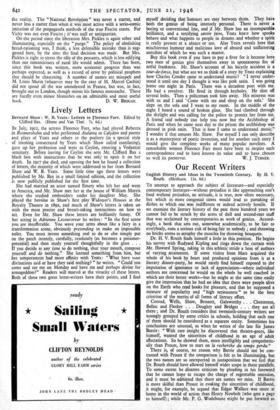Lively Letters
Bernard Shaw : W. B. Yeats : Letters to Florence Farr. Edited by Clifford Bax. (Home and Van Thal. 7s. 6d.)
IN July, 1912, the actress Florence Farr, who had played Rebecca in Rosmersholm and who performed Atalanta in Calydon and poems and plays of Yeats and others to the psaltery (in a special style of intoning consecrated by Yeats which Shaw called cantilating), gave up her profession and went to Ceylon, entering a Vedantist seminary. Before leaving for Ceylon she sent Mr. Clifford Bax a black box with instructions that he was only to open it on her death. In 1917 she died, and opening the box he found a collection of letters, the majority of which were addressed to her from Bernard Shaw and W. B. Yeats. Some little time ago these letters were published by Mr. Bax in a small limited edition, and the collection is now publicly published for the first time.
She had married an actor named Emery who left her and went to America, and Mr. Shaw met her at the house of William Morris where she studied embroidery under his daughter May. She played the heroine in Shaw's first play Widower's Houses at the Royalty Theatre in 1892, and much of Shaw's letters is taken up with the most precise and breath-taking instructions on how to act. Even for Mr. Shaw these letters are brilliantly funny. Of her acting in Adrienne Lecouvoreur he writes : " In the first scene you are insufferable. You wave your arms about like a fairy in a transformation scene, obviously pretending to make an impossible toilet. You must invent something real to do or else simply put on the patch intently, carefully, resolutely (as becomes a poisoner- potential) and then study yourself thoughtfully in the glass . . . If you decide at any time to do nothing, shut your mouth, compose yourself and do nothing." She learned something from him, but her temperament had more affinity with Yeats: " What have your divinations said or have they said nothing? " he writes. " Could you come and see me on Monday and have tea and perhaps divine for armageddon?" Readers will marvel at the vivacity cf these letters. Both of these two great letter-writers have their points, and I find myself deciding that honours are easy between them. They haves both the genius of being intensely personal. There is never .11 boring or conventional line, and if Mr. Shaw has an incomparable brilliance, and a terrifying savoir faire, Yeats knew how spooks behave and what happens to people in dreams. and whether a spirit is really present at a séance or not. Also Yeats reveals here that mischievous humour and malicious love of absurd and unflattering anecdote of which he was such a master.
Buy this book even if you have to pay a fiver for it because here two men of genius give themselves away in spontaneous fits of artful frankness. Mr. Shaw's account of his bicycle accident is a tour-de-force, but what are we to think of a story by Yeats explaining how Charles Conder came to understand music? " I never under- stood it until one day I thought it was like pink satin. I was going home one night in Paris. There was a decadent poet with me. He had a revolver. He fired in through keyholes. He shot off several bolts. Then a policeman took him away. His mistress was with us and I said Come with me and sleep on the sofa.' She slept on the sofa and I went to my room. In the middle of the night I heard a sound of broken glass. She had climbed through the skylight and was calling for the police to protect her from me. A friend said nobody can help you now but the Archbishop of Paris and when he came next day to the prison the archbishop was dressed in pink satin. That is how I came to understand music." I wonder if that amuses Mr. Shaw. For myself I can only describe it as a masterpiece of poetic invention, and for another such story I would give the complete works of many popular novelists. A remarkable women Florence Farr must have been to inspire such correspondence and to have known its value and to have . chosen


























 Previous page
Previous page